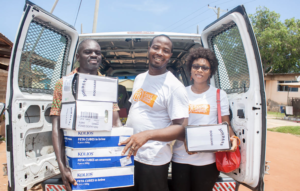3 Alumni of Young African Leadership Initiative Fighting COVID-19

2020 marks the tenth anniversary of the creation of the Young African Leadership Initiative (YALI) by President Obama. Since its initiation, YALI has spurred thousands of young people into community activism, entrepreneurship, innovation and other leadership roles. Now, these alumi of the Young African Leadership Initiative are fighting COVID-19.
What is YALI?
Created in 2010 as a part of USAID, YALI invests in the young people of Africa by providing educational resources, networking connections and skillsets to create community leaders. YALI has three main components: the Mandela Fellowship Program, Regional Leadership Centers (RLCs) and the YALI network. The Mandela Fellowship Program provides young Africans with an academic experience in the U.S., while the RLCs provide at institutions of higher learning in Africa. Both the Fellowship Program and the RLCs also offer leadership training. On the other hand, the YALI Network is an entirely online resource that aims to connect community leaders so they can learn from one another and work together.
YALI and COVID-19
Since the COVID-19 pandemic began, the YALI organization has been involved in providing African communities with the information to combat and prevent the coronavirus. For instance, in June, YALI held a virtual conference entitled “Resiliency for Business Owners” in which panelists discussed steps entrepreneurs can take to keep their businesses afloat during the pandemic.
Alumni of the Fellowship Program, RLC participants, and the YALI Network are all working together as part of the Young African Leadership Initiative fighting COVID-19 in their communities. The following three leaders have had a particularly significant impact on their communities’ responses to the pandemic.
- James Papy Kwabo Jr.
James Papy Kwabo Jr., a Liberian citizen, attended the Mandela Fellowship Program in 2019 and has since founded Alternative Youth Radio, the first youth radio station to exist in Liberia. After hearing misinformation about COVID-19 circulate in his community, he began using his platform to dispel false rumors and provide accurate information regarding the virus.
James broadcasts stories from other Mandela Fellowship leaders across Liberia that cover ways in which COVID-19 has affected their communities. Through this story-based approach, James hopes that members of his community will understand the gravity of the situation and take action to prevent the spread of the virus. - Elijah Addo
Elijah Addo, a Chef and alumnus of the RLC program in Ghana, founded the non-profit organization Food for All Africa in 2015, which provides food for more than 5,000 people throughout Ghana and West Africa. In February when the virus started to rapidly spread across the globe, Addo and his team began projecting which Ghanaian communities would become most vulnerable and face the greatest difficulties in accessing food. On March 22, 2020, Addo launched the Food for All Ghana COVID-19 Community Emergency Intervention program. In partnership with other organizations, this program works to ensure a continuous flow of food to communities that have become more vulnerable as a result of the pandemic. Through the distribution of food boxes across the country as well as the community kitchen operating in Accra, which is both the capital of Ghana and the city with the most reported COVID-19 cases, Addo’s emergency relief program has helped thousands. - Alfred Kankuzi
An alumnus of the Mandela Fellowship Program, Alfred Kankuzi has brought his leadership and innovation back to Malawi. After realizing that many Malawi residents received information about COVID-19 from misleading and confusing posts on social media, Kankuzi decided to take action using his skills in software and mobile app development.
In April, Kankuzi launched the phone app “COVID-19 NEBA,” which means “Hey neighbor” in Chichewa, that provides accurate information to users such as how the virus spreads and how to prevent contracting it. Given the low literacy rates in Malawi, Kankuzi’s app also provides audio content and illustrations to convey the same information. Furthermore, the app can be translated from Chichewa into two other languages, English and Tumbuka, in order to reach a wider audience.
On the 10th anniversary of the creation of YALI, members and alumni have stepped up to the plate to assist their communities as they battle COVID-19. Because of the skills participants honed through the program, the communities most strongly impacted by poverty and the pandemic have benefited from the leadership of the Young African Leadership Initiative fighting COVID-19.
– Alanna Jaffee
Photo: Alumni.state.gov
